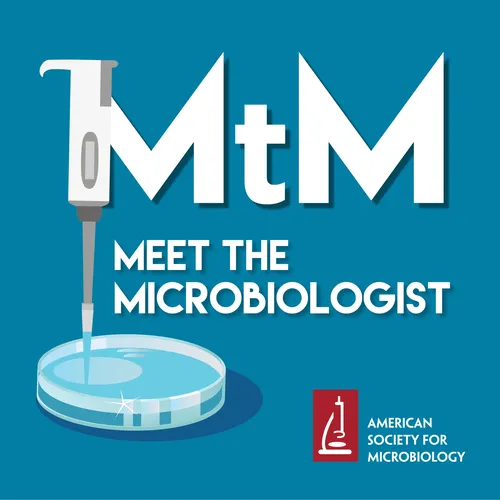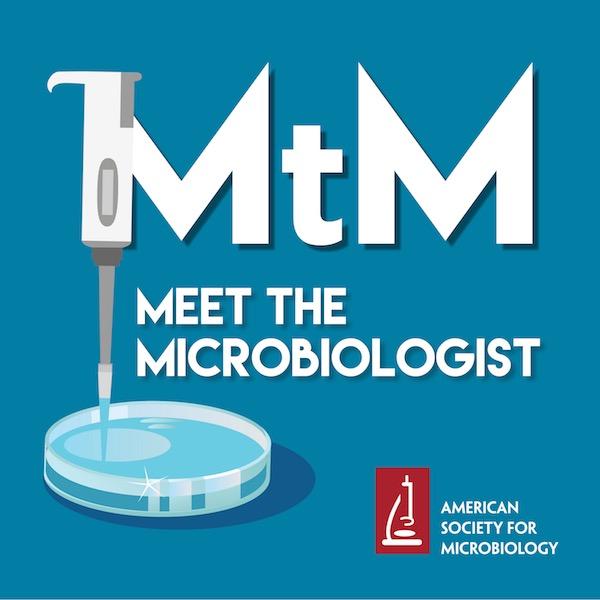
Meet the Microbiologist
Who is microbiology? Meet the Microbiologist (MTM) introduces you to the people who discover, innovate and advance the field of microbiology.
Go behind-the-scenes of the microbial sciences with experts in virology, bacteriology, mycology, parasitology and more! Share in their passion for microbes and hear about research successes and even a few setbacks in their field.
MTM covers everything from genomics, antibiotic resistance, synthetic biology, emerging infectious diseases, microbial ecology, public health, social equity, host-microbe biology, drug discovery, artificial intelligence, the microbiome and more!
From graduate students to working clinicians and emeritus professors, host, Ashley Hagen, Scientific and Digital Editor at the American Society for Microbiology, highlights professionals in all stages of their careers, gleaning wisdom, career advice and even a bit of mentorship along the way.
- Update frequency
- every 20 days
- Average duration
- 40 minutes
- Episodes
- 169
- Years Active
- 2008 - 2025

088: Using Bacterial Structures as Nanowires with Gemma Reguera
Gemma Reguera discusses her studies of Geobacter pili, which transfers electrons to iron oxide and other minerals, and can be used for new biotech applications.
Host: Julie Wolf
Subscribe (free) on …

087: Legionnaire’s Disease with Michele Swanson
Why do Legionnaire’s Disease outbreaks occur mostly in the summer? What is the connection of the Flint change in water source and Legionella outbreaks in the area? Michele Swanson discusses her work …

086: Toxoplasma gondii and neuro-invasive disease with Anita Koshy
How is Toxoplasma gondii, a protozoan that causes neuro-invasive disease, transmitted as a foodborne pathogen? Why are cats important in transmitting Toxoplasma infection? Anita Koshy answer these qu…

085: Using DNA technologies to answer epidemiological questions with Jennifer Gardy
Jennifer Gardy talks about whole-genome sequencing as a technique to address public health issues using genomic epidemiology. She talks about her research on TB and new DNA sequencing technologies, i…

084: How viral-bacterial interactions influence viral infection with Julie Pfeiffer
See the full shownotes at: asm.org/mtm
Julie Pfeiffer tells the story of how she serendipitously found a role for the gut microbiota during polio virus infection, and how she and her lab discovered a…

083: Microbial communication via quorum sensing with Pete Greenberg
Pete Greenberg tells how bacteria can communicate based on cell density, a phenomenon he helped name quorum sensing. He talks about therapeutics based on quorum-sensing discoveries, and how studying …

082: The struggle to study hepatitis C virus with Charlie Rice
Charlie Rice gives the history of learning to grow hepatitis C virus in culture, from pitfalls to hurdles and successes along the 20-year journey. He also talks about yellow fever virus, its vaccine,…

081: Developing infectious disease diagnostics with Melissa Miller
How are new diseases detected in a clinical microbiology lab? Melissa Miller talks about the time it takes to develop a test for a new disease (hint: it’s getting shorter). She also shares her defini…

080: Implementing One Health with Mathew Muturi
Veterinarian and epidemiologist Mathew Muturi tells how a Rift Valley Fever outbreak led to implementation of One Health-based policies. Muturi talks about his One Health training and its application…

079: Comparative Bacterial Genomics with Dave Rasko
Dave Rasko uses comparative bacterial genomics to find DNA sequences that influence virulence or antibiotic resistance. Dave talks about his studies of E. coli, Acinetobacter baumanii, and B. anthrac…

078: Tuberculosis treatment and mycobacterial genetics with Bill Jacobs
Bill Jacobs talks about developing mycobacterial genetic tools and using them to discover ways to shorten TB treatment. He also talks about the SEA-PHAGES program that allows high-school students to …

077: Influenza, politics, and scientific credibility with Ilaria Capua
Ilaria Capua talks about running an internationally renowned animal influenza lab, and her time spent in the Italian Parliament. Accused of virus trafficking as part of a national scandal, she has si…

076: Evolution of bacterial biofilm populations with Vaughn Cooper
Most bacteria live a sedentary lifestyle in community structures called biofilms. Vaughn Cooper tells us what bacterial biofilms are, why biofilms differ from test tube environments, and how long-ter…

075: Working with the Microbes in our Drinking and Waste Water with Marylynn Yates
Marylynn Yates discusses how the urban water cycle and its importance in eliminating waterborne pathogens. She describes the types of microbes that can survive in water and how testing for different …

074: Treating Ebola in America and Fecal Transfers with Colleen Kraft
Colleen Kraft talks about treating Americans who became sick with Ebola during the west African outbreak and were evacuated to her hospital for treatment. In the second half, Kraft talks about her ex…

073: Biological sex and influenza with Sabra Klein
Sabra Klein addresses the question: how does biological sex influence influenza infection and vaccination? She explains her findings on inflammation differences between males and females, and how the…

072: Microbial diversity of natural ecosystems with Jennifer Martiny
Jennifer Martiny describes the incredible microbial biodiversity of natural ecosystems such as soils and waterways. She explains how to add a bit of control in experiments with so many variables, and…

071: Neglected Tropical Diseases and Vaccine Advocacy with Peter Hotez
Peter Hotez talks about neglected tropical diseases: what are they, where are they found, and where did the term “neglected tropical disease” come from, anyway? Hotez discusses some of the strategies…

070: Influenza vaccine and susceptibility with Stacey Schultz-Cherry
Stacey Schultz-Cherry explains the selection process to choose the influenza virus strains to include in the annual influenza vaccine. Schultz-Cherry also discusses her research on the influence of o…

069: Biopreparedness and biosecurity with Gigi Kwik Gronvall
Gigi Kwik Gronvall talks to MTM about the importance of biopreparedness. Gronvall discusses her work in creating policies around potential natural, accidental, and man-made pandemics. She describes h…